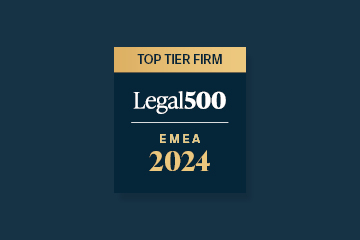Consortium collaboration in conflict with the Danish Competition Act
20 April 2016
In a ruling of 11 April 2016, the Danish Competition Appeals Board upheld that LKF Vejmarkering A/S and Eurostar Danmark A/S' consortium collaboration in connection with the Danish Road Directorate's tender for road markings was in conflict with the Danish Competition Act.
The case shows that undertakings contemplating a consortium collaboration with current or potential competitors should thoroughly analyse whether such collaboration could pose a problem under competition law. In particular, it should be considered whether the consortium participants would be able to perform the task in question individually.
On 11 March 2014 LKF Vejmarkering A/S ("LKF") and Eurostar Danmark A/S ("Eurostar"), which are the biggest and second biggest players on the market for road markings respectively, entered into an agreement to jointly submit a bid for the Danish Road Directorate's tender through the consortium Dansk Vejmarkerings Konsortium.
Based on the bids submitted, the Danish Road Directorate decided to award the contract for all three areas to the consortium that overall had submitted the lowest bid. One of the rejected bidders subsequently complained to the Danish Competition and Consumer Authority about the joint bid from LKF and Eurostar through the consortium.
On 24 June 2014, the Danish Competition Council decided that LKF's and Eurostar's consortium collaboration was in conflict with the Danish Competition Act. The Danish Competition Council found that it had been proved to the satisfaction of the Council that LKF and Eurostar separately would have been able to bid for the individual areas and the consortium collaboration therefore entailed that there was one competitor less to bid for the road marking contracts.
In its ruling of 11 April 2016, the Danish Competition Appeals Board upheld such decision as it found that it had been proved to the satisfaction of the Board that LKF and Eurostar separately would have been able to bid for the individual areas and that objectively the consortium collaboration had not been necessary. The fact that overall the parties had offered the lowest price in the call for tenders did not alter that the collaboration was in conflict with the Danish Competition Act.
The Danish Competition Appeals Board noted that this fact did not in any way prove that overall the Danish Road Directorate would not have been able to get a lower price if LKF and Eurostar had been competing for the individual areas.
Read the Danish Competition Appeals Board's ruling (in Danish).
Read the Danish Competition and Consumer Authority's guidelines (in Danish).
Tender for road markings
On 25 February 2014, the Danish Road Directorate launched a call for tenders for road markings in three Danish areas (Southern Denmark, Zealand and the Capital Region). The tender was planned in such a way that it was possible to only bid for one single area. It was also possible, however, to offer a total discount when bidding for several areas.On 11 March 2014 LKF Vejmarkering A/S ("LKF") and Eurostar Danmark A/S ("Eurostar"), which are the biggest and second biggest players on the market for road markings respectively, entered into an agreement to jointly submit a bid for the Danish Road Directorate's tender through the consortium Dansk Vejmarkerings Konsortium.
Based on the bids submitted, the Danish Road Directorate decided to award the contract for all three areas to the consortium that overall had submitted the lowest bid. One of the rejected bidders subsequently complained to the Danish Competition and Consumer Authority about the joint bid from LKF and Eurostar through the consortium.
On 24 June 2014, the Danish Competition Council decided that LKF's and Eurostar's consortium collaboration was in conflict with the Danish Competition Act. The Danish Competition Council found that it had been proved to the satisfaction of the Council that LKF and Eurostar separately would have been able to bid for the individual areas and the consortium collaboration therefore entailed that there was one competitor less to bid for the road marking contracts.
In its ruling of 11 April 2016, the Danish Competition Appeals Board upheld such decision as it found that it had been proved to the satisfaction of the Board that LKF and Eurostar separately would have been able to bid for the individual areas and that objectively the consortium collaboration had not been necessary. The fact that overall the parties had offered the lowest price in the call for tenders did not alter that the collaboration was in conflict with the Danish Competition Act.
The Danish Competition Appeals Board noted that this fact did not in any way prove that overall the Danish Road Directorate would not have been able to get a lower price if LKF and Eurostar had been competing for the individual areas.
Read the Danish Competition Appeals Board's ruling (in Danish).
Three guidelines on consortium collaborations
In 2014, the Danish Competition and Consumer Authority published three guidelines on competition law and procurement law issues in relation to consortium collaborations.Read the Danish Competition and Consumer Authority's guidelines (in Danish).






